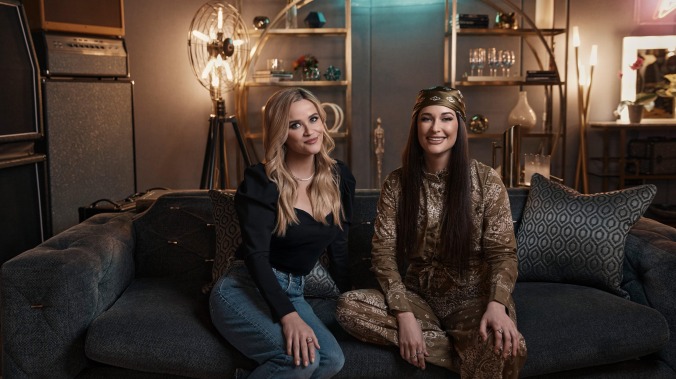My Kind Of Country review: Our kind of TV music competition
Reese Witherspoon and Kacey Musgraves executive produce Apple TV Plus' search for the next unconventional country star

Apple TV+ has its own Nashville-based singing show now, and it’s actually pretty good. My Kind Of Country, which premieres March 24, aims to set itself apart from other music competition shows with the diversity of talent represented on its stages: people from various backgrounds and countries all over the world, none of whom neatly fit into the mold of Modern Country Star. The most meaningful difference, though, is in the show’s very design. It’s a competition conceived of and hosted mainly by artists cut from shows like this who have gone on to achieve industry success beyond many artists who have won them.
Many forget, or never knew, that Kacey Musgraves, one of the show’s executive producers, began her career as a contestant on Nashville Star, a singing competition show that ran from 2003 to 2008 on USA. Now a major artist, at the time she placed seventh. Two of the three celebrity scouts on My Kind Of Country, singer-songwriters Mickey Guyton and Jimmie Allen, each auditioned for American Idol early in their careers, but were cut before the voting stages. Both being Black country musicians performing in a majority white genre, Allen and Guyton found it difficult to gain industry acceptance at first, and third scout Orville Peck, a white South African performer, has had his own struggles as a theatrical, openly gay country musician. On this show, when Mickey Guyton tells an artist that she has been cut from the first round, “This is not the end of the road for you,” she means it. As she later shares, this now successful musician “knows what it’s like not to be cheered for.” It’s this spirit of shared humanity and mutual respect that makes My Kind Of Country something different, even special.
Yes, contestants are sent home. That feature remains. (It is a competition after all.) But while there, these artists get all kinds of musical treats, the first of which is the gift of Nashville, Music City itself. Rather than perform on some gimmicky soundstage for the duration of the competition, with “block buttons” and spinning chairs, each showcase is set at an iconic Nashville venue. They begin at the humble, intimate 5 Spot, established in 1796, the oldest bar in the city, and they work their way up to bigger spaces. Even their de facto practice spot is Dark Horse Studios, a place that looks like a cabin that grew up to be a haunted castle, where many famous records by Dolly Parton, Taylor Swift, and others came to life.
The workshops they complete on their way to the finale, each hosted by one of the three scouts, also hold nice little surprises for the contestants. In Jimmie Allen’s workshop, the musicians get to collaborate with each other. (Actually, that seems stressful. And they’re assigned covers that are either kind of obvious or kind of crappy. Maybe that’s not a gift—or maybe it’s, like, the socks or candle equivalent?) In Mickey Guyton’s, they get to work with creative director Jemel McWilliams, who tries to help each artist bring out their personal best. It gets emotional, and people cry and have epiphanies and stuff. The lessons learned from these first two workshops are valuable and will likely last these musicians their entire careers.

 Keep scrolling for more great stories from A.V. Club.
Keep scrolling for more great stories from A.V. Club.